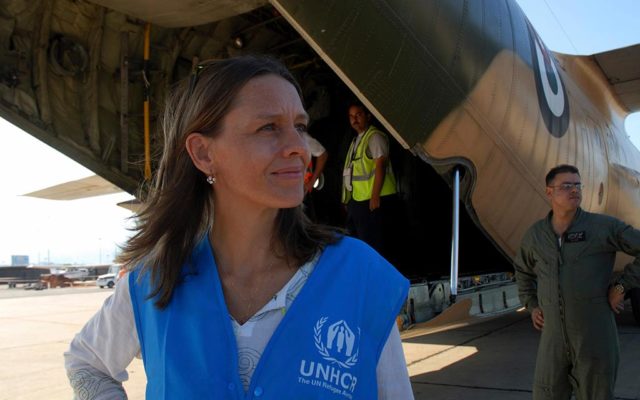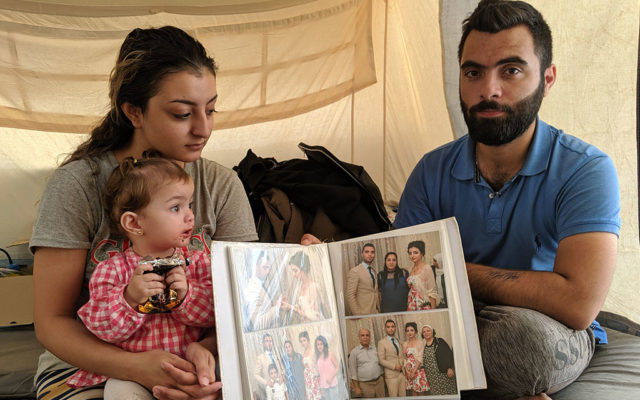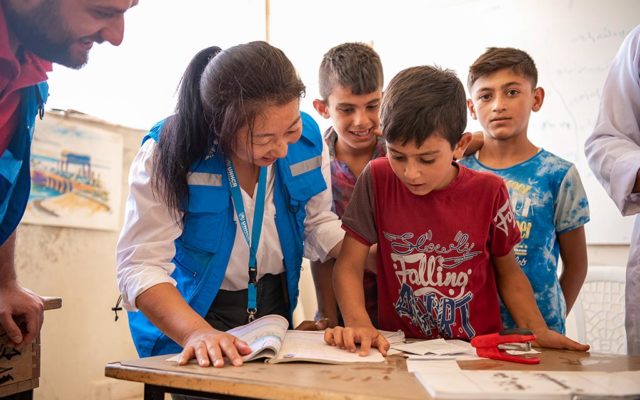In conversation with Dr Nellie Sangwa
Dr Nellie and her team work tirelessly to ensure refugee mothers in the Inke UNHCR camp can give birth safely.
© UNHCR/Hugh Kinsella Cunningham
As head of maternity at UNHCR’s Inke camp, Dr Nellie Sangwa and her team mean the difference between life and death for the refugee mothers they care for. The mothers fled from violence that has been taking place in the Central African Republic since 2016 and are now refugees in the neighbouring Democratic Republic of Congo (DRC). Due to the lack of supplies Dr Nellie has access to, the refugee mothers and their babies are often vulnerable to complications that can be avoided using the most basic of medical equipment.
Despite this, Dr Sangwa and her team are incredibly passionate about the community they serve and are working day and night to ensure the refugee mothers and their children are happy and healthy.
What made you become a doctor?
I was born in Kinshasa. I decided to become a medical doctor because when I was young, I already had this passion for helping others. I thought being a doctor would be the best way to help people. I used to follow the news on TV5 Monde where they’d show documentaries of children malnourished in countries affected by war. It seemed to be going on everywhere. I told myself the first thing I had to do was become a medical doctor, then the rest would follow. I ended up studying medicine in Lumumbashi, which is the second largest town in the DRC.
What drove you to become the head of maternity at the UNHCR Inke camp?
Being a refugee means you’re already in a state of vulnerability. Being a female refugee is even worse. Each time there is a conflict, women and children are most affected. Pregnancy is something that should bring joy, but if not properly handled, it can become a source of stress or unhappiness. If a mother isn’t getting the care and attention she needs, she gets stressed. This stress could cause them (the mother and the baby) health problems during the pregnancy. The mother even risks losing her baby in this position.
I don’t have kids, yet. But when I see these women and their babies, it fills me with joy. In Congo, it’s not a fact that a woman will be happy when she has a baby. But watching the smile of a mother who has just had a baby, even though she might be in some pain, really fills me with joy.
Can you tell us about a particular case that could have been prevented?
There are so many cases of women we have referred to the Gbadolite hospital who came back with infections.
There was a woman who began labour here. We referred her to Gbadolite. She was operated upon and she later caught an infection. Instead of spending a maximum of ten days, she spent two weeks. They tried a series of antibiotics before she got healed. She had to come back to the health centre.
Having sterilised pads has a serious impact on the health of the mother. If these are not used, there’s a strong chance the patient my develop an infection. This is because the uterus is shrinking again and is vulnerable to bacterial infections.
There was a case of a refugee mother we referred to the Gbadolite general hospital. She was operated upon there. She was referred to Inke, but we realized she had already started developing an inflammation in the uterus. The day after she got here, she died. We started asking questions, “Could it have been from the caesarean?” “Could it have been something she herself did?” I know they don’t have sterilized pads. But I know if a caesarean is done and standard medical attention isn’t given, the patient could develop a serious condition.
What do you need at the clinic to ensure the women can deliver safely?
First, we need a functional and equipped unit for surgery. We need a trained anaesthetist. We don’t have any of that in this entire health zone, even at the general hospital. It’s just people in the medical fields doing the job of anaesthetists. We need expert surgeons. Even in Gbadolite, it is general practitioners who are carrying out surgeries.
Whenever there is surgery needed, there are standards that must be met. Patients shouldn’t have infections after caesarean sessions; there must be no post-surgery infections. But that’s very common here because equipment might have been used that is not sterilised due to inadequate sterilisation equipment. You need a professional anaesthetist and a reanimation unit. After a caesarean, a patient should normally go into reanimation.
We recorded about 447 live births and 12 still births here at Inke camp. So, in a year, we need an average of over 400 packs. But that’s not enough.
Delivery kits are for emergencies. What we really need is babies’ kits. They contain items for the baby and the mother, including sanitary pads.
There’s nothing quite like bringing a healthy child into the world. Every mother should be able to enjoy the experience, in a safe and well-equipped environment.
Learn more about how your support today could ensure Dr Nellie and her team can save more lives.




